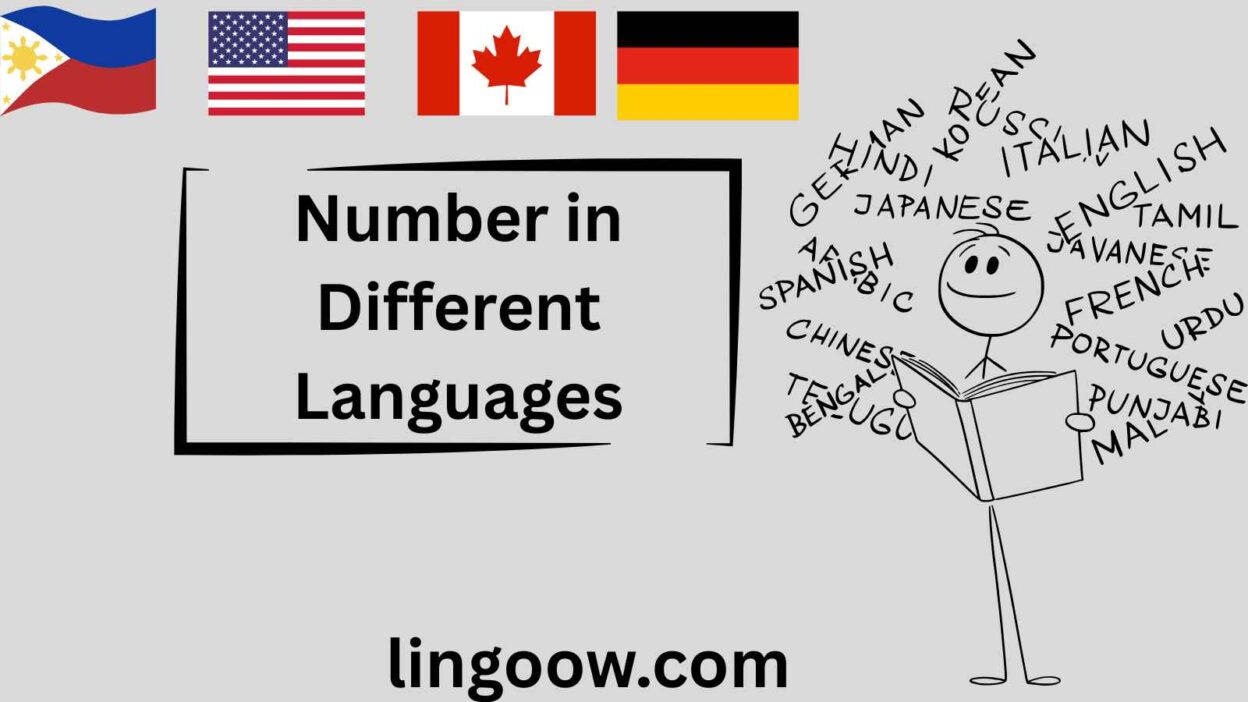Introduction
As a child, I remember sitting in my grandmother’s kitchen, counting the fresh-baked cookies she placed on the table. “One, two, three,” I’d chant, my small fingers pointing at each treat. Little did I know that across the world, children were doing the same, but in words that sounded like music from another land—uno in Spanish, ichi in Japanese, moja in Swahili. The concept of “number” is universal, a thread that weaves through every culture, tying us together in our shared need to quantify, measure, and make sense of the world. Numbers are more than mere tools; they’re a language of their own, carrying stories of trade, tradition, and human connection. In this blog post, we’ll explore how the word “number” is expressed across languages and cultures, revealing the beauty of our shared humanity through this simple yet profound concept.
Reference Table: The Word “Number” in Different Languages
Below is a table showcasing how the word “number” is expressed in 15 languages, along with brief cultural or linguistic insights.
| Language | Word for “Number” | Cultural/Linguistic Insight |
|---|---|---|
| Spanish | Número | Derived from Latin numerus, it reflects Spain’s historical connection to Roman numerals. |
| French | Nombre | Shares Latin roots with Spanish, often used in poetic contexts to denote quantity or rhythm. |
| German | Zahl | Rooted in Old High German, it emphasizes precision, reflecting German cultural values. |
| Italian | Numero | Similar to Spanish, with a musical quality often used in art and mathematics discussions. |
| Mandarin | Shù | Literally means “to count,” reflecting the Chinese focus on numerical systems in philosophy. |
| Hindi | Sankhya | Tied to ancient Indian mathematics and philosophy, notably in the Sankhya school of thought. |
| Japanese | Kazu | Used in both everyday counting and poetic expressions, symbolizing harmony in numbers. |
| Arabic | Raqam | Associated with numerals in Arabic calligraphy, a key element in Islamic art and science. |
| Swahili | Nambari | Borrowed from Arabic, reflecting trade influences along the East African coast. |
| Zulu | Inombolo | A Bantu word, often used in storytelling to denote order or sequence in narratives. |
| Yoruba | Nọ́mbà | Linked to Yoruba numerology, where numbers hold spiritual significance in divination. |
| Maori | Tau | Also means “to count” or “season,” reflecting the cyclical nature of Maori culture. |
| Hawaiian | Helu | Used in hula and chants, where numbers guide rhythm and storytelling. |
| Cherokee | Kanuhelvdi | A complex term tied to Cherokee’s syllabary, emphasizing numbers in written tradition. |
| Samoan | Numera | Reflects Polynesian influences, often used in communal contexts like resource allocation. |
European Languages
In Europe, the word for “number” often traces back to Latin numerus, revealing the continent’s shared linguistic heritage. In French, nombre is not just a mathematical term but a poetic one, used in literature to evoke rhythm or quantity, as in “le nombre des étoiles” (the number of stars). Spanish número carries a similar romantic flair, often tied to music and dance, like counting beats in flamenco. Italian numero shares this Latin root, and its use in art—think of numbered frescoes or musical scores—highlights Italy’s cultural emphasis on aesthetics. In German, Zahl reflects a cultural affinity for precision, seen in Germany’s contributions to mathematics and engineering. Other European languages, like Portuguese (número) and Dutch (nummer), echo similar themes, with slight variations in pronunciation that reflect regional identities. These words aren’t just labels; they carry the weight of Europe’s history in science, art, and philosophy, where numbers shaped everything from architecture to astronomy.
Asian Languages
Asia’s linguistic diversity offers a rich tapestry of expressions for “number.” In Mandarin Chinese, shù (数) is deeply rooted in the culture’s reverence for numerology, where numbers like 8 (prosperity) or 4 (death) carry symbolic weight. In Hindi, sankhya connects to ancient Indian mathematics, which gave the world the concept of zero and the decimal system. Japanese kazu is versatile, used in everyday counting but also in poetry, where numbers evoke harmony or transience, as in haiku. Korean su (수) shares similar philosophical undertones, often tied to Confucian principles of order. In Arabic, spoken across over 20 countries from Morocco to Iraq, raqam is not just a word but an art form, seen in the intricate numerals of Islamic calligraphy. Other Asian languages, like Thai (lêek) or Vietnamese (số), reflect local traditions of trade and storytelling, where numbers guide everything from market transactions to lunar calendars. Across Asia, the word for “number” is a gateway to understanding cultural values, from spiritual beliefs to scientific innovation.
African Languages
Africa’s linguistic landscape is as diverse as its cultures, and the word for “number” reflects this vibrancy. In Swahili, spoken in over 20 countries like Kenya and Tanzania, nambari is a loanword from Arabic, a testament to centuries of trade across the Indian Ocean. Zulu inombolo, used in South Africa, carries narrative weight, often marking sequence in oral traditions. Yoruba nọ́mbà, spoken in Nigeria, is tied to Ifá divination, where numbers hold spiritual significance. Languages like Amharic (mamer) in Ethiopia or Hausa (lamba) in northern Nigeria show how numbers are embedded in daily life, from counting livestock to marking festival days. In many African societies, numbers are not just practical but sacred, used in rituals, storytelling, and community organization, reflecting a deep connection to both the material and spiritual worlds.
Indigenous & Island Languages
Indigenous and island languages offer unique perspectives on “number.” In Maori, spoken in New Zealand, tau connects counting to the natural cycles of seasons and harvests, reflecting a worldview where numbers are part of the environment. Hawaiian helu is integral to hula, where numbers guide dance steps and chants, preserving history through rhythm. Cherokee kanuhelvdi, from North America, is tied to the tribe’s syllabary and mathematical traditions, used in everything from trade to storytelling. Samoan numera, spoken in Samoa and other Pacific islands, reflects communal values, where numbers help allocate resources in village gatherings. Across over 20 indigenous and island cultures, from Inuktitut (angakkuuniq) in Canada to Fijian (naba), the word for “number” is often intertwined with oral traditions, spirituality, and community life, highlighting a holistic approach to quantification.
Cultural Insights
The word “number” has evolved alongside human civilization. In ancient Mesopotamia, numbers were etched on clay tablets for trade and astronomy, while in India, the concept of zero revolutionized mathematics. In Europe, Roman numerals shaped legal and architectural systems, while in China, numerology influenced everything from architecture to marriage dates. Across cultures, numbers carry symbolic weight: in Christianity, 7 represents divine perfection; in Islam, numbers like 99 (Allah’s names) hold spiritual significance; in Hinduism, 108 is sacred in meditation. The word’s evolution reflects humanity’s need to order the chaos of existence, from counting stars to marking time. Whether in ancient scripts or modern languages, “number” is a testament to our shared quest for meaning.
Proverbs and Sayings
Numbers inspire wisdom across cultures. Here are a few proverbs and sayings:
- Spanish: “No hay dos sin tres” (There’s no two without three), implying good or bad things come in threes.
- Chinese: “一山不容二虎” (One mountain cannot hold two tigers), using numbers to express competition.
- Yoruba: “Ẹni tí ó bá mọ nọ́mbà rẹ̀, yóò mọ ọjọ́ rẹ̀” (One who knows their number knows their day), linking numbers to destiny.
- Maori: “Kia tau te rangimarie” (Let peace be counted), where counting signifies harmony. These sayings show how numbers shape cultural expressions, from fate to balance.
FAQs
Why does the word for “number” sound similar in many languages?
Many languages, especially in Europe, share Latin or Indo-European roots, like numerus or sankhya, leading to similarities. Trade and colonization also spread words like nambari (Swahili) from Arabic.
What’s the oldest known usage of the word?
The concept of “number” dates back to ancient Sumerian and Egyptian scripts (c. 3000 BCE), where words for counting were tied to trade and astronomy. Precise origins vary by language.
How do cultures differ in expressing numbers?
Some cultures, like Chinese, imbue numbers with symbolic meaning (e.g., 8 for luck). Others, like Yoruba, use numbers in spiritual contexts, while Western cultures often emphasize mathematical precision.
Conclusion
The word “number” is more than a linguistic marker; it’s a bridge across cultures, a universal language that speaks to our need to count, create, and connect. From the poetic nombre of France to the spiritual nọ́mbà of Yoruba, each expression carries a piece of its culture’s soul. Numbers remind us that, despite our differences, we all seek to measure and make sense of our world. What’s the word for “number” in your language, and how does it shape your cultural story? Share your thoughts in the comments below, and let’s continue counting the ways we’re connected!




